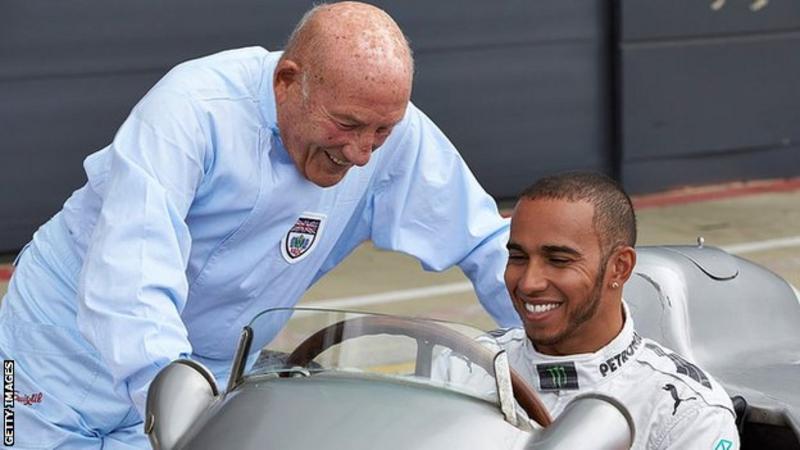Sir Stirling Moss: Motor racing legend dies aged 90 after long illness
Sir Stirling Moss, who has died
aged 90, personified motorsport to at least two generations of his
countrymen after establishing himself as the greatest racing driver of
his era in a short but stellar career.
Moss raced in Formula 1 in
the sport's romantic age of the 1950s and early 1960s, winning 16 grands
prix. Yet despite his rivals at the time acknowledging he was the best,
he never won the World Championship.Partly, that was to do with bad luck - poor reliability certainly hurt him in the two seasons he should have won the title, in 1958-59.
Partly, it was because of his determination to drive for English, privateer teams, particularly the one run by his friend Rob Walker.
And partly because of a racing driver's determination to put victory before all else.
But to those who know motorsport, Moss' failure to win the drivers' World Championship reflects not at all on his ability, and only on the fact that the sport's greatest prize depends at least as much on a driver's machinery as it does his talent, and therefore can never be the only gauge of their ability.
In Moss' case, there was never any doubt how good he was. From 1948 to his enforced retirement in 1962, Moss won 212 of the 529 races he entered across all motorsport categories. Of those who raced against him, only the greats Juan Manuel Fangio and Jim Clark were comparable, and the careers of Moss and Clark only briefly coincided.
Fangio was different - for the two were rivals for six years in the 1950s, and team-mates for one.
Some observers claim Moss was better even than Fangio. Like Ayrton Senna, Michael Schumacher and Tazio Nuvolari, each man has advocates who believe he was the greatest racing driver of all time.
For his part, Moss always insisted Fangio was his superior, and the record backs him up. Quite apart from the Argentine's five F1 world titles and 24 wins from 51 grands prix, the older man was demonstrably the superior driver when they were team-mates at Mercedes in 1955, winning four races to Moss' one.
Moss believed Fangio let him win that sole trophy - it was, after all, in the British Grand Prix, and Moss won by only 0.2 seconds. If it was a gift, though, Fangio, a man with as much class as he had talent, never admitted it.
Once Fangio had retired early in the 1958 season, there was no doubt about Moss' standing - he was head and shoulders above his contemporaries.
He should have walked the World Championship that year but four wins and a second place in his Vanwall were counter-balanced by five retirements. That enabled the less talented Mike Hawthorn, who won only once in the more reliable Ferrari, to snatch the title by just one point.
In losing, though, Moss made as much a name for himself as he did in winning.
There was the obvious injustice of the faster man, with four times as many victories, missing out. Beyond that, though, there was Moss' sportsmanship.
At the Portuguese Grand Prix, three races from the end of the season, Hawthorn was under threat of disqualification after being accused of reversing on the track.
Moss' impassioned defence of his friend and rival allowed Hawthorn to keep his second place.
In the final race of the season, in Casablanca, Moss needed to win to give himself a chance of the title and, if he did, Hawthorn needed to be second to fend him off.
As Moss dominated at the front, Hawthorn drove a tactical race to ensure he was ahead of Moss' Vanwall team-mates, and was then let through into second place in the closing stages by Ferrari partner Phil Hill.
It was a similar story in 1959, when Moss drove a Cooper for Walker's team, apart from two grands prix for BRM. Moss and his team were generally by far the fastest combination, but the car finished only three of the nine races, of which he won two and finished second to Australian Jack Brabham's Cooper in the other.
But despite his car's poor reliability, Moss went into the final round in Sebring, Florida, still in with a chance of the championship. Again he led - from pole position - only for the car to fail once more. Brabham benefited to claim the first of three world titles.
Badly injured in a crash at the 1960 Belgian Grand Prix, Moss missed most of that year, recovering to win the season-ending US Grand Prix.
The following season, his last in F1, was probably his greatest. His Lotus was under-powered compared to the dominant Ferraris, but at certain tracks Moss' skill could make the difference.
He took brilliant victories at Monaco, where the Climax engine's power deficit was somewhat cancelled out by the tight and twisty nature of the track, and at the daunting Nurburgring, where a gamble on fitting rain tyres after a pre-race shower paid off thanks to further rain in the race.
The win in Germany was arguably the greatest of Moss' F1 career, but it was to be his last.
He retired from the final race of the season in the USA and never made it to the start of the next.
https://www.bbc.com/sport/formula1/52260896





Post a Comment